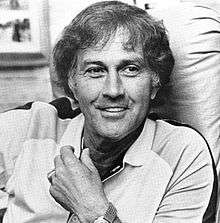Earl Owensby Studios
Earl Owensby Studios (shortened to E.O. Studios) is an American-based film and television film studio that was founded in 1974 by producer/actor Ernst Earl Owensby (born 1935).[1] The studio was responsible for the development, production, and distribution of dozens of low-budget action films (distributed mostly to outdoor Drive-in and Grindhouse theaters).[2]
 | |
| Film/television production company | |
| Industry | Motion pictures |
| Founded | 1974 |
| Founder | Earl Owensby |
| Headquarters | , |
| Website | earlowensbystudios |
Notable films
On November 10, 1973, producer/actor Earl Owensby began production on his first feature film, the revenge actioner Challenge. Directed by Martin Beck, the film starred Owensby as Frank Challenge, a Senatorial candidate driven to taking the law into his own hands after the murder of his family. Distributed in 1974 by Cinemation Industries to a reported 134 markets, Challenge proved to be quite profitable, leading directly to the establishment of E.O. Studios, a 200-acre motion picture facility located in Shelby, North Carolina.[3]
In 1975, E.O. followed up Challenge with a sequel entitled The Brass Ring (with Owensby returning again as the vengeful hero Frank Challenge).[lower-alpha 1] The film was later retitled for television release as Manhunter.[lower-alpha 2]
Over the next four years, E.O. released one film per year starring Owensby: Dark Sunday (1976), Death Driver (1977), Seabo (1978),[lower-alpha 3] and Wolfman (1979).[lower-alpha 4] The ultra-violent Seabo (originally known as Buckstone County Prison) made national news headlines after the Motion Picture Association of America’s ratings board refused to grant E.O. ratings approval (essentially making it an X rated film). E.O. appealed the ruling and it was released with an R rating.
In 1980, E.O. produced two films, both with a musical theme, and both featuring Ginger Alden, who had been the fiancee of Owensby’s friend Elvis Presley at the time of Presley’s death.[lower-alpha 5] The first film, called Lady Grey, was the studio’s only film at that point to not star Owensby (the lead male role instead went to country music star David Allan Coe), while the second film, entitled Living Legend: The King of Rock and Roll, saw Owensby back on screen, portraying a character known as Eli Canfield, who bore a striking resemblance to Elvis. The soundtrack for Living Legend film was provided by another Presley friend, Roy Orbison.[lower-alpha 6]
In an interview with Ed Bradley on CBS’s 60 Minutes, Owensby explained that E.O. Studios’ success was due to never spending more than a million dollars to make a film and never signing a distribution deal that would net them less than eight million. That proved to be a sound strategy over the course of the next decade, as E.O. continued to crank out such profitable—though under-the-radar—films as A Day of Judgment (1981), Hit the Road Running (1983), Hot Heir (1984), Tales of the Third Dimension (1984), Chain Gang (1984), The Last Game (1984), Dogs of Hell (1984), Gremloids (1984), and Damon’s Law: The Rutherford County Line (1987).
Partnering With James Cameron
In 1988, E.O purchased the unfinished, abandoned Cherokee Nuclear Power Plant, just outside Gaffney, South Carolina, with an eye towards turning it into a studio. The studio soon partnered with director James Cameron, who filled one of the plant's reactors with water to shoot his sci-fi epic The Abyss.[4] It was, at that time, the world's largest underwater sound stage.
Recognizable talent
Though E.O. was notorious for mostly utilizing unknown talent in its productions, many well-known names came through its doors. 1984's Gremloids, which E.O. produced in conjunction with Regency Productions, featured comedians Paula Poundstone and Chris Elliott, while the Grindhouse action film Hooch (1977) starred Gil Gerard and Danny Aiello. Though not an in-house E.O. film, the Oscar-nominated 1984 film Rueben, Rueben (starring Tom Conti and Kelly McGillis) filmed on the studio's lot, as did 1987's Florida Straits (with Raul Julia and Fred Ward). Director Worth Keeter (who helmed eight films for E.O.) went on to be the primary director for the Power Rangers franchise.
External links
References
Video samples
- The Brass Ring (1975 film), YouTube
- Manhunter (1975 TV film), Fandango
- Seabo (1979 film), YouTube
- Wolfman (1979 film), Hindi Movies
- "I'd rather have a memory than a dream," sung by Ginger Alden, from Lady Grey (1980 film), YouTube
- "Movin'," by Roy Orbison, from Living Legend (1980 film), YouTube
Inline citations
- Bio: "Earl Owensby," IMDb
- "Backwoods Movie Mogul Owensby Has High Hopes For His Low-Budget Empire," by Lewis Beale, Chicago Tribune, October 20, 1985
- Earl Owensby Profile, Earl Owensby Studios
- "This Is What James Cameron’s The Abyss Set Looks Like 20 Years Later," by Michaele Reyes, cinemablend
.com ) (operated by Cinema Blend, LLC, Vancouver, Washington), April 16, 2014